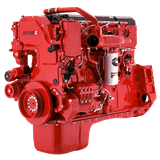 Cummins 2016 ISX15 diesel engine has increased fuel economy following the company’s compliance with stricter federal emissions requirements.
Cummins 2016 ISX15 diesel engine has increased fuel economy following the company’s compliance with stricter federal emissions requirements.Ask Cummins if meeting tougher federal emissions standards means sacrificing performance.
“No, not at all,” says Mario Sanchez-Lara, Cummins director of on-highway marketing communications. “The technology that is available to us now, that helps us to deal with particulate matter and NOx, has really provided more degrees of freedom to achieve efficiency without sacrificing performance.”
Cummins announced this week that the U.S. Environmental Protection Agency has certified its line of on-highway diesel and natural gas engines for meeting both the current EPA regulations and the second step in greenhouse gas (GHG) and fuel-efficiency standards which take effect in January 2017.
Sanchez-Lara points out that the EPA’s increased regulations have led Cummins’ engineers to develop engines that not only have improved emissions, but are also more fuel-efficient.
Fuel efficiency is improved across the commercial vehicle engine lineup from 5.0 liters to 15 liters.
Amy Boerger, Cummins vice president of sales and support, explains, “For example, efficiency improvements implemented in the 2016 ISX15 400hp to 475hp ratings will provide customers with fuel economy gains over the 2013 ISX15, ranging from 2.5 percent on the base engine up to 7.5 percent with a SmartAdvantage Powertrain with ADEPT (SmartCoast) features.”
Throughout 2014 and 2015, Cummins implemented efficiency enhancements that enable its engines to meet EPA 2016 and GHG 2017 requirements. On-board diagnostics requirements are met with enhanced monitors, ensuring that exhaust tailpipe emissions stay within the EPA limits.
A particulate matter (PM) sensor has been implemented, and electronic controls have been enhanced to interact with the diesel exhaust fluid (DEF) quality sensor implemented by original equipment manufacturers (OEMs) on DEF tanks. With a focus on continuous improvement, Cummins plans to incorporate further product enhancements to improve performance, reliability and efficiency throughout 2016.
Following the Volkswagen diesel debacle in which the German automaker was caught using defeating techniques producing higher emissions in real world use, a higher level of scrutiny is expected.
“True,” Sanchez-Lara explains, “and this drives increased pressure in assuring the effectiveness of engine controls and diagnostic monitors while yet preserving the leading efficiency of diesel engines. The granted certification is testimony of the Cummins commitment to cleaner environment and higher efficiency.”









